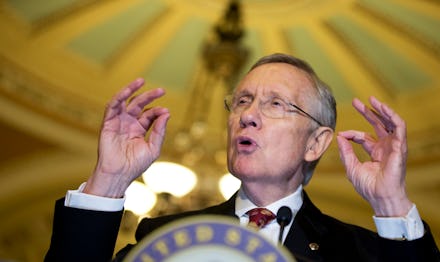Harry Reid's 'Nuclear Option' is Exactly What the Founding Fathers Had in Mind

Thursday, Senate Majority Leader Harry Reid took up a debate to strike down filibuster rules that block presidential nominations. Here's a quick breakdown of how we got here, and why it matters for democracy:
The U.S. Constitution Says So
The United States Constitution permits the president to appoint high-level executive officers and federal judges, but only with the "advice and consent" of the Senate. This requirement was viewed by the framers of the Constitution as a check on presidential power, but it was not intended to give any additional power to a single party.
The Current Situation
Currently, the Senate procedural rules permit a technical filibuster, which requires 60 votes to stop. It is not the type of filibuster we learned about in our high school civics courses, where a senator has to stand and talk until they no longer can. Instead, the Senate rules permit a preemptive threat to filibuster, which then triggers the requirement for 60 votes. This rule has existed for so long because no party stays in the majority forever, and each party is fully aware of the powerlessness that can result from being in the minority.
The current dispute is over President Barack Obama's decision to appoint three judges to the U.S. Court of Appeals for the D.C. Circuit. The D.C. Circuit is considered the second most powerful court in the United States because it is viewed as a stepping stone for judges to the U.S. Supreme Court, it hears many of the most contentious political cases, and nearly all of its decisions are eventually reviewed by the U.S. Supreme Court. Republicans have invoked the technical filibuster because they do not want Obama to fill the vacant seats on the D.C. Circuit.
And while the Democrats comprise a simple majority in the Senate, they do not have the necessary 60 votes to stop this long, drawn-out process.
Republicans have argued that the reason for the filibuster is the lack of need for new judges on that court, and that the bench is currently politically balanced. Neither of these reasons stand up to scrutiny. There has not been a significant decline in the number of cases or complexity of cases presented to the D.C. Circuit over the last few decades. And, the bench is not politically balanced because nearly all of the senior judges were Republican-appointed judges. The true political score of the D.C. Circuit is closer to 12 for Republicans and four for Democrats.
The Nuclear Option